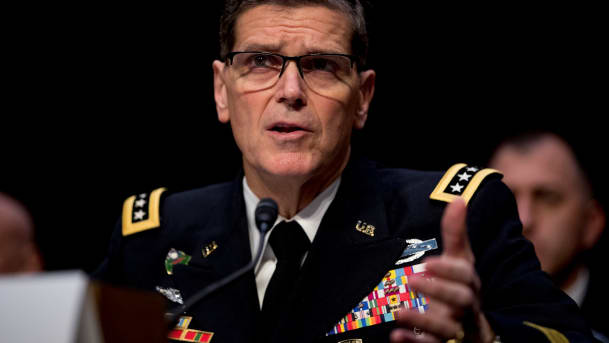Gen. Joseph Votel, the head of US Central Command, speaking before the Senate Armed Services Committee, February 5, 2019 (Andrew Harnik/AP)
UPDATE 0945 GMT:
Turkish Defense Hulusi Akar has announced the launch of cooperative Turkish and Russian patrols in Idlib Province in northwest Syria.
Akar said Turkey will patrol in opposition-held areas and Russia in territory occupied by regime militias and their foreign allies.
However, there was immediate scepticism whether the arrangement would be effective, with reports of regime shelling on Khan Sheikhoun in Idlib and Kafrzita and Lataminah in northern Hama on Friday night.
Turkey and Russia announced a demilitarized zone in September, covering Idlib and northern Hama Provinces.
However, Assad regime forces have continued shelling of civilian areas in Idlib. They escalated the attacks last month, killing at least 47 people — most of them women and children — in a 10-day period. The assault focused on cities such as Ma’arat al-Num’an and Khan Sheikhoun, with local sources reporting the latter turned into a “ghost town” as thousands fled.
Russia had refrained from any criticism of the regime shelling. Instead President Vladimir Putin and Foreign Minister Sergey Lavrov said “terrorists” must be eliminated.
Hardline Islamist fighters responded with attacks on regime checkpoints in northern Hama, killing at least 25 troops.
Syria Daily, March 1: Russia Provides Cover for Assad Regime Attacks on Idlib Civilians
Syria Daily, March 4: Hardline Islamists Attack Regime Forces in Northwest
Under Assad Regime Attack: A 1st-Hand Account from Idlib Province
Akar said that the joint patrols will be an “important step for the continuation of the ceasefire and ensuring stability”.
He said Turkey is not in direct contact with the Assad regime, asserting that Ankara is only holding talks with Russia and occasionally with Iran.
A column of armoured Turkish military and medical vehicles drives on a patrol along a road in the de-militarised zone in the western countryside of Syria's Aleppo province near the town of Kafr Halab on March 8, 2019.
Via @omar_hajkadour / AFP pic.twitter.com/nCY9b8s40N— FARED (@FARED60350386) March 8, 2019
Continuing its pushback of Donald Trump, the US military has said there is no specific date for withdrawal of any American troops in Syria.
In December Trump impulsively decided, during a phone call with Turkish President Recep Tayyip Erdoğan, to withdraw all 2,000 US personnel — many of whom are supporting the Kurdish-led Syrian Democratic Forces which removed the Islamic State from northern and eastern Syria.
The Pentagon and high-level officials, such as National Security Advisor John Bolton, devoted themselves to limiting the order. They now say that at least 400 US troops will remain, half with the SDF and half at the US base at Tanf near the Iraqi border. They pushed out the timetable for the departure of others to four to six months.
On Thursday, Gen. Joseph Votel, head of US Central Command, went farther by removing any specific date for departure. He told the House Armed Services Committee:
What is driving the withdrawal of course is our mission, which is the defeat of ISIS, and so that is our principal focus, and that is making sure that we protect our forces, that we don’t withdraw in a manner that increases the risk to our forces.
There is not pressure on me to meet a specific date at this particular time.
The White House offered no response yesterday.
‘
Trump’s order brought the resignations of Defense Secretary Jim Mattis and Brett McGurk, the US envoy to the anti-ISIS coalition. However, other officials rallied against immediate withdrawal.
They cite the possibility of a resurgence of the Islamic State, now in its final village east of the Euphrates River and in the Syrian desert to the west. They have emphasized the need to avoid abandonment of Kurdish partners, amid concerns that Turkey — which considers the Kurdish militia YPG “terrorists” linked to the Turkish Kurdish insurgency PKK — could move into Kurdish-held territory with military force.
Bolton and the Pentagon also see the US presence as a necessary counter to the influence of Iran, an essential backer of the Assad regime.
Votel implicitly chided Trump on Thursday for buttressing the position of Russia, which has propped up the regime with its military intervention and political support.
“[Trump’s announcement] puts Russia more in the driver’s seat….It solidifies their presence in the Middle East,” Votel said.
He warned that Islamic State fighters and their families evacuated from the last ISIS territory in Syria are largely “unrepentant, unbroken, and radicalized” and waiting “for the right time to resurge”:
We will need to maintain a vigilant offensive against this now widely dispersed and disaggregated organization that includes leaders, fighters, facilitators, resources, and toxic ideology.


In Syria, Who Will Stay With U.S. Troops?
https://www.npr.org/2019/02/25/697839238/in-syria-who-will-stay-with-u-s-troops 2/25/2019
–
[Walid Phares:] I suggested a multinational peace force led by #France with other European countries including #Italy, #UK, #Poland, others and Arab countries including #Egypt, #SaudiArabia, others, 2 deploy units in #EastSyria, end #ISIS & block pro #Iran militias. US would intervene if needed
https://twitter.com/WalidPhares/status/1076348434670444545 12/21/2018
–
U.S. Gives European Allies Friday Target to Sign on to Syria Proposal
The Trump administration is pressing eight European allies to commit by Friday to a U.S. proposal to stabilize northeastern Syria, U.S. officials said, setting a target meant to persuade reluctant partners to join Washington in the still-developing plan.
https://www.wsj.com/articles/u-s-gives-european-allies-friday-deadline-to-sign-on-to-syria-proposal-11551995825 3/7/2019